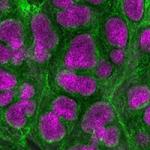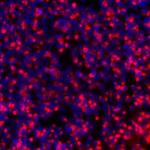
Ramiro Iglesias-Bartolome, Ph.D.
Senior Investigator
Laboratory of Cellular and Molecular Biology
NCI/CCR
Research Topics
Tissue development and homeostasis depend on the activity of specific stem cell populations. In particular, the epidermis of the skin and oral mucosa is highly dependent on resident self-renewing stem cells due to its continuous need to replace cells lost by desquamation or repair wounds. This makes the epidermis a unique system to study stem cell biology. The proper balance between self-renewal and differentiation in epithelial stem cells is largely achieved by a milieu of micro-environmental signals controlling stem cell fate decisions and cellular responses. Deregulation of this delicate balance is central to the development of numerous pathologies, including aging-related disorders, decreased tissue regeneration, and cancer.
Using a combination of in vitro cell culture systems and animal models, we elucidate the signaling mechanisms that control and drive epithelial stem cell self-renewal and differentiation. Our focus at this moment is on G-protein-coupled receptors (GPCRs) and their signaling partners. GPCRs are the largest family of cell-surface molecules involved in signal transduction, playing central roles in numerous physiological processes and pathological conditions along with their associated G proteins. Since GPCRs are the direct or indirect target of more than 25% of therapeutic drugs on the market, they represent a unique potential target for the pharmacological intervention of stem cell activity.
Most GPCRs relay their signal by coupling to heterotrimeric Gα, β, and γ subunits. Gα proteins are classified into four different families: Gαs, Gαi/o, Gαq/11 and Gα12/13. We have recently demonstrated that among Gα proteins, Gαs plays a central role in coordinating self-renewal and differentiation in epithelial stem cells. In mice, conditional epidermal deletion of the gene coding for Gαs protein or inactivation of its signaling partner protein kinase A (PKA) is sufficient to cause an aberrant expansion of the stem cell compartment, resulting in basal cell carcinoma (BCC) formation. These findings reveal that Gαs-PKA function as part of a tumor-suppressive axis, limiting the proliferation of epithelial stem cells and maintaining hair follicle and skin homeostasis. Furthermore, they indicate that GPCRs may be involved in differentiation and tumorigenicity within the epidermal stem cell compartment.
Our major goal is to identify particular GPCRs and their linked signaling partners that function as master regulators of epithelial stem cells during skin development and tissue homeostasis and their connection to malignant transformation and cancer. Our approaches include a variety of animal models and primary cell culture systems, synthetic biology methods, gene expression profiling by RNA sequencing, high-throughput screenings, microscopy, and biochemical assays.
Biography
Ramiro Iglesias-Bartolome obtained his degree in Biology at the National University of Cordoba, Argentina. He then joined the laboratory of Dr. Jose L. Daniotti at the same University, where he obtained his Ph.D in 2008. In 2009 he joined NIDCR at the NIH for his post-doctoral training in the group of Dr. J. Silvio Gutkind. In 2015 he joined the Developmental Skin Biology Section, NIAMS-NIH, as a research fellow in the group of Dr. Maria I. Morasso. In 2016 he joined the Laboratory of Cellular and Molecular Biology, NCI, as a Stadtman Tenure-Track Investigator.
Selected Publications
- Iglesias-Bartolome R, Torres D, Marone R, Feng X, Martin D, Simaan M, Chen M, Weinstein LS, Taylor SS, Molinolo AA, Gutkind JS. Inactivation of a Gα(s)-PKA tumour suppressor pathway in skin stem cells initiates basal-cell carcinogenesis. Nat Cell Biol. 2015;17(6):793-803.
- Iglesias-Bartolome R, Callejas-Valera JL, Gutkind JS. Control of the epithelial stem cell epigenome: the shaping of epithelial stem cell identity. Curr Opin Cell Biol. 2013;25(2):162-9.
- Iglesias-Bartolome R, Patel V, Cotrim A, Leelahavanichkul K, Molinolo AA, Mitchell JB, Gutkind JS. mTOR inhibition prevents epithelial stem cell senescence and protects from radiation-induced mucositis. Cell Stem Cell. 2012;11(3):401-14.
- Iglesias-Bartolome R, Gutkind JS. Signaling circuitries controlling stem cell fate: to be or not to be. Curr Opin Cell Biol. 2011;23(6):716-23.
- Iglesias-Bartolome R, Gutkind JS. Exploiting the mTOR paradox for disease prevention. Oncotarget. 2012;3(10):1061-3.
Related Scientific Focus Areas




Molecular Biology and Biochemistry
View additional Principal Investigators in Molecular Biology and Biochemistry

This page was last updated on Tuesday, September 16, 2025